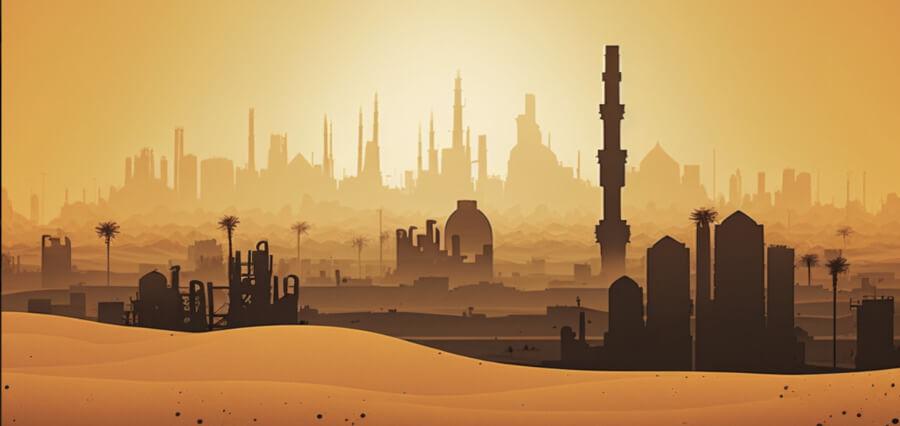Comprehensive Fundamentals of Transformations in the Middle East

Introduction
The Middle East, a region renowned for its rich history and diverse cultures, has become a dynamic hub for economic growth and transformation in recent decades. From oil-driven economies to diversified business landscapes, the region has undergone profound changes that have positioned it as a global player in various industries. This article explores the fundamental factors driving business transformations in the Middle East, highlighting key trends and initiatives shaping its economic landscape.
Economic Diversification
Moving Beyond Oil Dependence
Traditionally reliant on oil and gas exports, many Middle Eastern countries have recognized the need to diversify their economies to ensure long-term sustainability. This shift is driven by:
- The volatility of oil prices
- The necessity for stable revenue streams
- The aspiration to reduce dependence on finite resources
Investment in New Sectors
To achieve diversification, countries are heavily investing in various sectors such as:
- Technology — Establishing tech hubs and investing in AI, blockchain, and fintech.
- Tourism — Developing hospitality industries and promoting cultural heritage.
- Renewable Energy — Expanding solar and wind energy initiatives.
- Finance and Manufacturing — Creating financial hubs and industrial zones.
Innovation and Technology
Rise of Smart Cities
Governments and businesses are investing in digital infrastructure, startups, and research centers to foster innovation. Smart City initiatives are being developed in major metropolitan areas, integrating IoT, AI, and automation to enhance efficiency.
Tech-Focused Zones
Countries like the UAE and Saudi Arabia have launched tech zones to attract international companies and talent. The rise of fintech, AI, and e-commerce is redefining traditional business models, facilitating a shift towards a knowledge-based economy.
Entrepreneurship and Startups
Growing Startup Ecosystem
A thriving startup ecosystem is reshaping the business landscape in the Middle East. Governments and private investors provide support through:
- Funding and venture capital
- Mentorship programs
- Favorable regulatory frameworks
Incubators and Accelerators
Startup accelerators and incubators have flourished, fostering innovation and enabling young businesses to scale rapidly. The entrepreneurial spirit is driving job creation, economic growth, and further diversification.
Infrastructure Development
Transforming Physical Landscapes
Massive infrastructure projects, including transportation networks, energy facilities, and urban developments, are enhancing connectivity and attracting foreign investment. Notable projects include:
- Dubai’s Burj Khalifa — A symbol of modern development.
- Qatar’s FIFA World Cup Stadiums — Showcasing regional commitment to world-class infrastructure.
Foreign Investment and Global Partnerships
Attracting Multinational Corporations
The Middle East actively seeks foreign investment through:
- Special Economic Zones — Offering tax incentives and business-friendly policies.
- Free Trade Agreements — Facilitating cross-border commerce.
- Relaxed Ownership Regulations — Encouraging direct foreign participation.
Knowledge and Technology Exchange
Strategic global partnerships facilitate:
- Technology transfer
- Access to international markets
- trengthened economic ties with global players
Tourism and Hospitality
A Major Economic Driver
With its rich cultural heritage, historical sites, and modern attractions, the Middle East is becoming a global tourism hotspot. Investments in tourism infrastructure have led to:
- Development of luxury resorts and entertainment hubs
- Hosting of international events like the Dubai Expo and FIFA World Cup
Sustainable Development
Green Initiatives
Environmental sustainability and corporate social responsibility are gaining traction. Governments and businesses are:
- Investing in renewable energy projects
- Implementing waste reduction policies
- Promoting eco-friendly urban planning
Regional Integration
Strengthening Economic Collaboration
Organizations like the Gulf Cooperation Council (GCC) are facilitating:
- Trade and investment collaboration
- Harmonized regulations and reduced trade barriers
- A more integrated and competitive regional market
Human Capital Development
Investing in Education
A skilled workforce is essential for sustained economic growth. Middle Eastern countries are:
- Enhancing academic partnerships
- Establishing vocational training programs
- Promoting STEM education and leadership training
E-commerce and Digital Transformation
The Rise of Online Retail
With a young, tech-savvy population, e-commerce is thriving. Businesses are adapting by:
- Expanding digital payment solutions
- Strengthening online marketing strategies
- Enhancing customer-centric delivery services
Cultural Diversity and Global Appeal
A Bridge Between East and West
The Middle East’s strategic location and cultural diversity make it a prime destination for businesses looking to expand globally. International firms leverage the region as a gateway to:
- European, Asian, and African markets
- Culturally diverse consumer bases
- Strategic trade routes
Resilience and Adaptability
Overcoming Economic Challenges
Despite geopolitical uncertainties and economic fluctuations, businesses in the Middle East display remarkable resilience. Governments and enterprises adopt flexible strategies to:
- Navigate crises like the COVID-19 pandemic
- Mitigate financial risks
- Capitalize on emerging opportunities
Conclusion
The Middle East’s transformation is driven by economic diversification, technological innovation, entrepreneurship, infrastructure development, and sustainable growth. As the region continues to adapt and evolve, its ability to embrace change while preserving its cultural heritage positions it as a key player in the global economy. Businesses and investors looking to engage with the Middle East must recognize its dynamic nature and seize the opportunities presented by its ongoing transformation.
- Art
- Causes
- Crafts
- Dance
- Drinks
- Film
- Fitness
- Food
- Games
- Gardening
- Health
- Home
- Literature
- Music
- Networking
- Other
- Party
- Religion
- Shopping
- Sports
- Theater
- Wellness


